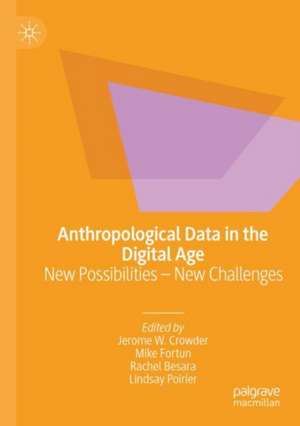Anthropological Data in the Digital Age: New Possibilities – New Challenges
Editat de Jerome W. Crowder, Mike Fortun, Rachel Besara, Lindsay Poirieren Limba Engleză Paperback – 13 noi 2020
| Toate formatele și edițiile | Preț | Express |
|---|---|---|
| Paperback (1) | 638.11 lei 6-8 săpt. | |
| Springer International Publishing – 13 noi 2020 | 638.11 lei 6-8 săpt. | |
| Hardback (1) | 643.48 lei 6-8 săpt. | |
| Springer International Publishing – 13 noi 2019 | 643.48 lei 6-8 săpt. |
Preț: 638.11 lei
Preț vechi: 750.72 lei
-15% Nou
Puncte Express: 957
Preț estimativ în valută:
122.11€ • 126.77$ • 101.83£
122.11€ • 126.77$ • 101.83£
Carte tipărită la comandă
Livrare economică 24 martie-07 aprilie
Preluare comenzi: 021 569.72.76
Specificații
ISBN-13: 9783030249274
ISBN-10: 3030249271
Pagini: 270
Ilustrații: XXIV, 270 p. 19 illus.
Dimensiuni: 148 x 210 mm
Greutate: 0.35 kg
Ediția:1st ed. 2020
Editura: Springer International Publishing
Colecția Palgrave Macmillan
Locul publicării:Cham, Switzerland
ISBN-10: 3030249271
Pagini: 270
Ilustrații: XXIV, 270 p. 19 illus.
Dimensiuni: 148 x 210 mm
Greutate: 0.35 kg
Ediția:1st ed. 2020
Editura: Springer International Publishing
Colecția Palgrave Macmillan
Locul publicării:Cham, Switzerland
Cuprins
1. Introduction.- 2. Understanding Data Management Planning and Sharing: Perspectives for the Social Scientist.- 3. Building Socio-technical Systems to Support Data Management and Digital Scholarship in the Social Sciences.- 4. Digital Workflow in the Humanities and Social Sciences: A Data Ethnography.- 5. Archaeological Data in the Cloud: Collaboration and Accessibility with the Digital Archaeological Archive of Comparative Slavery (DAACS).- 6. Opportunities and Challenges to Data Sharing with American Tribal Nations.- 7. Digital Transformations: Integrating Ethnographic Video into a Multi-Modal Platform.- 8. Studying and Mobilizing the Impacts of Anthropological Data in Archives.- 9. The Past is Prologue: Preserving and Disseminating Archaeological Data Electronically.- 10. Metadata, Digital Infrastructure, and the Data Ideologies of Cultural Anthropology.- 11. Interview with Deb Winslow (National Science Foundation).- 12. Post-Script.
Notă biografică
Jerome W. Crowder is Associate Professor of Preventative Medicine and Community Health and Associate Director of the Institute for the Medical Humanities at the University of Texas Medical Branch, Galveston, USA.
Mike Fortun is Associate Professor of Anthropology at the University of California, Irvine, USA.
Rachel Besara is Associate Dean of Libraries at Missouri State University, USA.
Lindsay Poirier is Assistant Professor of Science and Technology Studies at the University of California, Davis, USA.
Mike Fortun is Associate Professor of Anthropology at the University of California, Irvine, USA.
Rachel Besara is Associate Dean of Libraries at Missouri State University, USA.
Lindsay Poirier is Assistant Professor of Science and Technology Studies at the University of California, Davis, USA.
Textul de pe ultima copertă
For more than two decades, anthropologists have wrestled with new digital technologies and their impacts on how their data are collected, managed, and ultimately presented. Anthropological Data in the Digital Age compiles a range of academics in anthropology and the information sciences, archivists, and librarians to offer in-depth discussions of the issues raised by digital scholarship. The volume covers the technical aspects of data management—retrieval, metadata, dissemination, presentation, and preservation—while at once engaging with case studies written by cultural anthropologists and archaeologists returning from the field to grapple with the implications of producing data digitally. Concluding with thoughts on the new considerations and ethics of digital data, Anthropological Data in the Digital Age is a multi-faceted meditation on anthropological practice in a technologically mediated world.
Caracteristici
Wide-ranging collection discussing the impact of digital technology and digital data collection on anthropological practice Discusses data such as texts, audio, photography, and film/video from perspectives ranging from the technical to the ethical Sets forth thoughts on the future directions of digital scholarship, particularly in the social sciences
